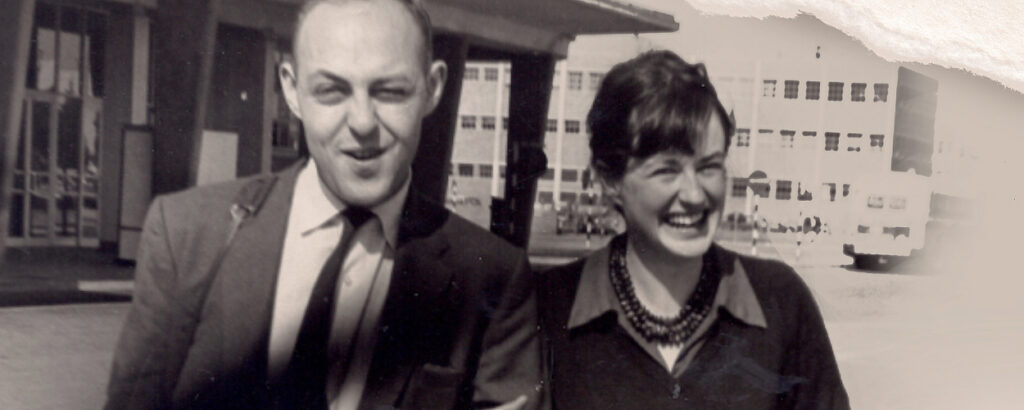
Gail Louw’s new play The Only White, which opens for previews at Chelsea on 4 April, is a hard-hitting and affecting drama set in the apartheid South Africa of the 1960s.
Seen through the eyes of a teenage Peter Hain, who was later to flee to the UK with his family to become a leading Labour cabinet member and now a member The House of Lords, the play tells the story of John Harris, the only white man to be executed in Apartheid South Africa.
Both Hain and David Wolfe, Harris’s son, along with Louw are amongst the hundreds of white anti-apartheid activists who fled to Britain in the late sixties.
We spoke with Louw about the play and what it was like to revisit that moment in time.
Q&A with Gail Louw
What can you tell us about The Only White?
In July 1964, a phone rings at Johannesburg Railway Station. John Harris speaks quickly into the receiver: “This is the African Resistance Movement. We have planted a bomb, It is not our intention to harm anyone. Clear the Concourse.” They don’t. The bomb explodes, twenty-three are injured and one dies.
The Only White is the story of the one white man who was executed for political activities in Apartheid South Africa. It is a true retelling of a man’s need to do something big, something significant, that he believed could change the course of history and end oppression.
The repercussions of his action are enormous, not only in its actual negative impact on his cause, but also on the people closest to him. These were his wife Ann, his tiny baby, and the family that supported and held everyone together – the Hain family in Pretoria, and their fourteen year old son, Peter Hain, who grew up to become a Cabinet Minister in the British Parliament and who is currently in the House of Lords.
The Only White is a story of courage, comradeship and love.
How did it feel to revisit that time in history, and in your own past?
The bombing of Jo’burg station was a key moment in South African history. I have vivid recollections as a thirteen year old hearing about it, being shocked by it, but also being on the periphery of a group of my mother’s friends who knew him well, talking about him – a lovely person but such a stupid thing to do!
Why did he do it? What drove him to do something so reckless and damaging? Those thoughts had never left me and I wanted to know more about who he was and what it was like from his perspective. How would a wife respond and would she stand by him? The element of their relationship is tremendously poignant as we have their reaction to themselves and each other in the letters that they wrote.
How important was it to involve Peter Hain and John Harris’s son David Wolfe in the creation of the play?
Peter Hain has written two books; ‘The Pretoria Boy’, and ‘Ad and Wal’. These paint a vivid picture of his parents and their relationship with John and Ann. I was able to get a wonderful sense of their lives and their characters from the books – truly inspiring, dedicated people. But it was really helpful to spend time speaking to Peter himself, as well as his brother Tom, and an old friend who is mentioned in the play, Jill Chisholm. They all spoke of the fact that Peter has really always been an extremely good bloke!
David Wolfe, John’s son, was very helpful in reading a draft of the play and correcting what he saw as being not absolutely accurate. That made the play far more truthful than it might have been without his involvement. Both are extremely encouraging and supportive.
Do you see the play as speaking to current issues as well as the movement in the 1960s?
This is an important question because the play deals with injustice and oppression and people’s ways of fighting it. Some placed bombs, others provided food and support to prisoners, others wrote articles and letters, and younger ones, like Peter, were there to learn and question, and give help wherever he possibly could.
Unfortunately throughout the world today, oppression exists and there are people who place their own comfort and safety above the needs of others. This play celebrates those brave heroes who put the freedom of others way above themselves.
The Only White is about the one white person to be executed for political activities in Apartheid South Africa. But we must remember constantly that there were very, very many Black and Indian people who were executed. South Africa is a different country to the 60s, but it has many problems that continue to exist. Luckily not capital punishment.
How would you describe the play to someone considering buying a ticket?
This play is a story based on fact, depicting a period in Apartheid South Africa, where an act of extreme violence was undertaken by a gentle, loving man who felt that such an act might lead to change for the oppressed people of his country. Although warnings were given to clear the concourse of the railway station, they were not acted upon, showing the callous nature of the government at the time who prevented action being taken, knowing that the carnage would work wonders for their propaganda purposes.
The play shows the horrors of what lies ahead and the way people deal with fighting to the last to try and avert the death penalty. And the way they deal with it is through love, and support and kindness.
This is a beautifully enacted depiction of the story and is both poignant and heartwarming in the way the characters support and love each other.
The Only White runs at Chelsea Theatre from 4 th to 22 April –
Welcome














